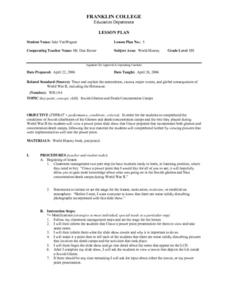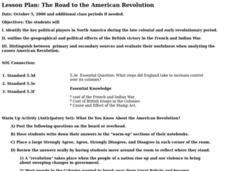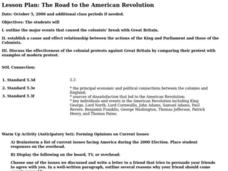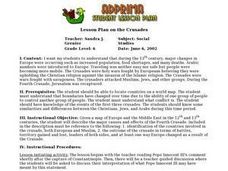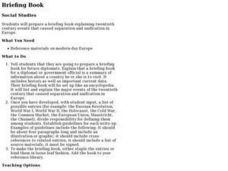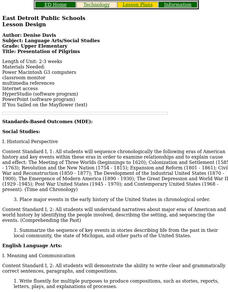Curated OER
Baby Boom and the Culture of the 1950's
Eleventh graders explain the causes, course, and consequences of the United States' role in World War II.
Curated OER
Imperialism and Expansion: Part 1
Young scholars explore the era of imperialism and expansion of the United States. In this American history lesson, students play a game regarding the U.S. attempts to expand the nation in the late 1800s and early 1900s.
Curated OER
Hiroshima, From All Sides
Students comprehend how the Atomic Bomb affected humanity and ended WWII. They comprehend how the Atomic Bomb affected: scientists, Japanese citizens, and US leaders. Students receive a copy of Hiroshima, Readers Theater Rubiv. They...
Curated OER
Jewish Ghettos and Death/Concentration Camps
Students trace and explain the antecedents, causes, major events, and global consequences of World War II, including the Holocaust. They assess the conditions of Jewish inhabitants of the Ghettos and death/concentration camps and the...
Curated OER
Scapegoating
Students examine how stereotypes, prejudices and discriminatory practices lead to individuals and groups being blamed for events. They are introduced to the internment of Japanese Americans during World War II.
Curated OER
The Road to the American Revolution
Fifth graders explore the causes of the American Revolution. In this American Revolution lesson, 5th graders examine the people, places, and events that led to the outbreak of war in the colonies.
Curated OER
Time Traveler Blues: The Great Depression
Students research the Great Depression Era and its effect on the world. They create a multimedia presentation over the Great Depression from many angles.
Curated OER
Social Studies: Bombing of Hiroshima
Students read a first person account of the bombing of Hiroshima written by a Japanese physician. By reading Michihiko Hachiya's journal, they discover the fatalities caused by the bomb itself and later by radiation poisoning. To...
Curated OER
The Road to the American Revolution
Students consider the case for forming a new, independent nation. In this American Revolution lesson, students examine the people, places, and events that led to the outbreak of war in the colonies. Students compare colonial protests to...
Curated OER
Tolerance and Genocide
Students investigate the causes of genocide. For this cultural diversity lesson, students discuss genocide incidents in Africa, the Middle East, and Eastern Europe. Students then write essays about what they would do if their cultural...
Curated OER
Native Americans During the 19th and 20th Centuries
Learners explore major events in Native American history in the nineteenth and twentieth centuries. In this American history lesson, students listen to lectures, examine photographs, and analyze music regarding Native American history...
Harry S. Truman Library & Museum
Marshall Plan: Convince the American People
This is an excellent resource for US history classes, especially AP history. After learning some background on the Marshall Plan, the class, divided into two groups, researches opposing positions on this aid program. Groups read and...
Curated OER
The Greek Gods
What were the early Greek myths? Have elementary students examine the Persian Wars and read various Greek myth in order to identify the cause and the results of the Persian Wars. Myths, activities, simulations, and a unit plan are links...
Curated OER
Briefing Book
Students prepare a briefing book highlighting important twentieth century events in Europe. The book lists and explains the major events of the twentieth century that caused separation and unification in Europe.
Curated OER
Presentation of Pilgrims
Students are given a category to research (clothes, life before the New World, the voyage, etc.) about Pilgrim life. s Students, in groups, create presentations using software program such as PowerPoint.
NASA
Einstein and His Times
Scholars research and present on the historical happenings of 1919. After sharing their findings, pupils debate about how Congress dealt with the moral issues of the time. The evaluation asks learners to write a persuasive...
City University of New York
The Split Over Suffrage
Compare and contrast Frederick Douglass's and the National Women's Suffrage Association's stances on equal rights and suffrage with a series of documents and worksheets. Learners work together or independently to complete the packet, and...
Curated OER
End of Mandates and the Middle East
Ninth graders investigate the original mandates of the League of Nations regarding the Middle East. They listen to a lecture/PowerPoint presentation on the end of the mandate system, and complete a fill-in-the-blank worksheet that...
Curated OER
Road to Revolution (Part 3)
Young scholars explore the road to the American Revolution. For this American history lesson, students research the events in colonial America that led to the Declaration of Independence and the American Revolution. They then create a...
Curated OER
The Study of the Spanish-Speaking People of Texas: Overcoming Adversity
Young scholars examine the photographs of Russell Lee and identify the obstacles faced by Mexican-Americans in Texas during the early and mid-20th century. They discuss the ways they overcame these obstacles and relate it to obstacles...
Curated OER
The Russian Revolution
For this Russian Revolution study guide worksheet, students respond to 15 short answer questions. The questions correlate to assigned readings in a textbook.
Curated OER
Battle of the Bulge
Students identify the date and location of the Battle of the Bulge and the sides battling in it and who the military leaders were. They identify what each side did in the battle, who the victor was, and the condition each side was in...
Curated OER
Reagan and Bush: The Conservative Years
Learners investigate the conservative agenda of the Republican Presidents Ronald Reagan and George Bush. They conduct Internet research, evaluate an edition of the Wall Street Journal, and write and publish a special-edition newspaper...



